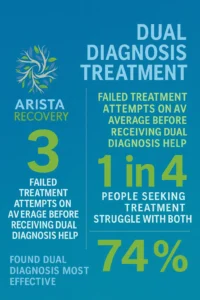You Tried Treatment—and It Didn’t Help. Now What?
You showed up. You wanted change. You followed the plan, gave it time, maybe even completed the program. And yet, weeks or months later, you felt the same—or worse. That kind of letdown cuts deep. But here’s the truth: if treatment didn’t work, it might not be because you failed. It might be because it wasn’t the right kind of treatment. At Arista Recovery, we specialize in dual diagnosis treatment—a type of care designed for people whose mental health struggles are tightly wound around their substance use.
If that’s you, it doesn’t mean you’re broken. It means you deserve treatment that understands the full picture.
What Is Dual Diagnosis Treatment—And Why Does It Matter?
Dual diagnosis treatment means treating both a mental health disorder and a substance use disorder at the same time. These aren’t two separate tracks—it’s integrated care, where therapists, medical staff, and psychiatric providers work together to address how your mind and your use interact.
Common co-occurring combinations we treat include:
- Depression and alcohol use
- Anxiety and stimulant addiction
- PTSD and opioid use
- Bipolar disorder and polysubstance use
- Trauma history with recurring relapse
Without treating both, you’re stuck playing whack-a-mole with symptoms. You manage cravings, but panic keeps you from sleeping. You stop using, but the depression creeps back in. Recovery should feel like healing, not like playing defense 24/7.
“I Thought I Was the Problem”
One client came to us after completing three programs in two years. Each time, she followed the rules. Each time, she relapsed within weeks. She was ready to give up—on herself, on treatment, on everything. But during intake at Arista Recovery, a psychiatric nurse picked up on something others had missed: a history of untreated bipolar II.
That changed everything.
With the right diagnosis and coordinated care, she started to understand her cycles—not just suppress them. For the first time, she said, “I’m not scared of myself anymore.”
That’s the shift we aim for.
How Dual Diagnosis Treatment Works at Arista Recovery
We’re based in Hilliard, and we’re built for people who’ve already tried “standard” treatment and still felt stuck. Our dual diagnosis program includes:
Integrated Care Teams
You won’t be passed from one department to another. Our therapists, addiction counselors, and psychiatric staff work together from day one.
Trauma-Informed Therapy
Many dual diagnosis clients have a trauma history—whether it’s obvious or buried. We use approaches like EMDR and DBT to help people safely process what’s underneath.
Medication Support
If needed, we offer psychiatric medication to help stabilize mood, reduce anxiety, or manage intrusive thoughts—not as a quick fix, but as part of a whole-person plan.
Skill-Building and Real-Life Prep
We don’t just help you stop using—we help you build a life where you don’t have to. That includes emotional regulation, healthy routines, and practical planning.
“Once We Treated My Anxiety, Recovery Finally Felt Possible”
“I was always told to get clean first and deal with my anxiety later. But anxiety was why I used in the first place. Once we started treating both, I didn’t feel like I was fighting myself all day.”
– Dual Diagnosis Client, 2023
That feeling—of not having to white-knuckle your way through every moment—is the difference integrated care can make.

Signs You Might Need Dual Diagnosis Treatment
It’s easy to think, “Maybe I’m just bad at this,” especially after one or two failed programs. But the issue might not be effort—it might be that something important was never addressed.
You might benefit from dual diagnosis care if:
- You’ve completed treatment but always relapse during emotional lows
- You’ve been diagnosed (or suspect) depression, anxiety, PTSD, or bipolar disorder
- Therapy never seemed to “get to the point” for you
- You’ve tried medications that didn’t seem to help
- You feel like your mental health and your use feed into each other
These are common in our Hilliard community—and treatable with the right approach.
Why Past Treatment Might’ve Missed the Mark
Many addiction programs were built decades ago when mental health was seen as secondary—or worse, as a distraction. People were told to “work the program” first and deal with depression later. But mental health doesn’t wait in line.
At Arista Recovery, we treat what’s actually happening—not what people think “should” be happening. That includes:
- Not blaming clients for “non-compliance” when they’re overwhelmed
- Adapting treatment plans when trauma or mood issues surface
- Checking for underdiagnosed conditions during intake
- Making therapy feel safe again—not like a test you have to pass
Because if someone’s brain is screaming, “You’re not safe,” no amount of step work or coping tools will stick.
Why Hilliard Residents Trust Us for Dual Diagnosis Care
We’re not a massive chain. We’re part of the community. Our Hilliard facility was built with one goal: real, personalized care for people who’ve been overlooked or underserved in other programs.
We offer:
- A welcoming, stigma-free environment
- Short-term and long-term program options
- A staff who listen first and talk second
- A calm, therapeutic setting—not chaos, not pressure
And yes—we’ve helped people who swore they were “treatment resistant” finally feel seen, supported, and stable.
FAQ: Dual Diagnosis Treatment in Hilliard, Ohio
What makes dual diagnosis treatment different?
It treats both your mental health and substance use at the same time, rather than isolating one issue. This helps prevent relapse caused by untreated symptoms and creates a more stable recovery path.
Is this just for people with serious mental illness?
No. You don’t need a long-standing diagnosis to benefit. Many clients have untreated anxiety, undiagnosed PTSD, or mood symptoms that were never addressed before.
I’ve tried meds before. What if they don’t work?
That’s valid. We use psychiatric support as one part of care—not the whole answer. If you’ve had bad experiences with medication, we take that seriously and work with you, not against you.
Can I do this while working or taking care of family?
Yes. We offer flexible outpatient and partial hospitalization options for those who need to balance treatment with life. We’ll help you find a level of care that works.
Do you accept insurance?
We work with most major insurance providers and can verify your benefits quickly. If you’re unsure, just call—we’ll walk you through it without pressure.
📞 Let’s Try Something That Fits This Time
You’ve already done the hard part: surviving. Now let’s find something that actually supports your healing. Call (866)430-9267 or visit our Dual Diagnosis Treatment page to learn how Arista Recovery helps people in Hilliard move from doubt to trust—and into recovery that finally feels real.



